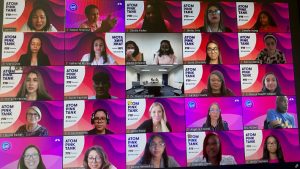
Chris Ellis, Department of Decision Sciences and Information Systems instructor, looks on during an exercise using matches and dice designed to teach the theory of constraints.

Jerry Haar, associate director of the Knight Ridder Center for Excellence in Management and professor in the Department of Management and International Business at the head of the table, and to his right, Irma Cavillo, director of the Foreign Trade School at AGEXPRONT, join Guatemalans from private business and non-profit organizations.
Three Florida International University faculty members traveled to Guatemala in March, 2006, to help train trainers in international marketing—specifically exporting—at AGEXPRONT, the business association for non-traditional exports.
Jerry Haar, associate director of the Knight Ridder Center for Excellence in Management and professor in the Department of Management and International Business in the college, led the teaching team. Chris Ellis, instructor in the college’s Department of Decision Sciences and Information Systems, and Marc Resnick, of the College of Engineering, joined him.
The project is part of the U.S Trade and Development Agency (USTDA)-funded contract won by the college and Decision Analysis Partners. As co-director, Haar is responsible for all training activity. He shares directorship responsibilities with Wayne Henderson of Decision Analysis Partners.
“By participating in the AGEXPRONT program, we are training volunteer trainers who each commit to delivering seminars that will ultimately give more than 2,000 Guatemalans the opportunity to take short courses in topics such as market intelligence, financing, business plan development, and pricing policies,” Haar said.
Training sessions focus on hands-on learning.
One of several courses presented by the university team, the train-the-trainers session taught by Ellis focused on teaching techniques. He used seemingly simple activities and basic tools—like scissors, tape, paper, matches, and dice—that required active participation to drive home more complex theories.
“Experiential learning is always an effective way to get people really involved,” he said. “It leaves the mind open. I simply have to ask ‘what did you learn?’ and students reach their own conclusions—which can be more powerful than my standing there and pontificating.”
Other courses offered during this Guatemalan program covered quality, productivity, and innovation as well as effective information usage.
The general assessment is that the volunteer trainers—some of whom are also university professors—had fun and learned something along the way.
“The classes were all very well received,” Ellis said.
What the attendees learned will now be shared exponentially across Guatemala.




